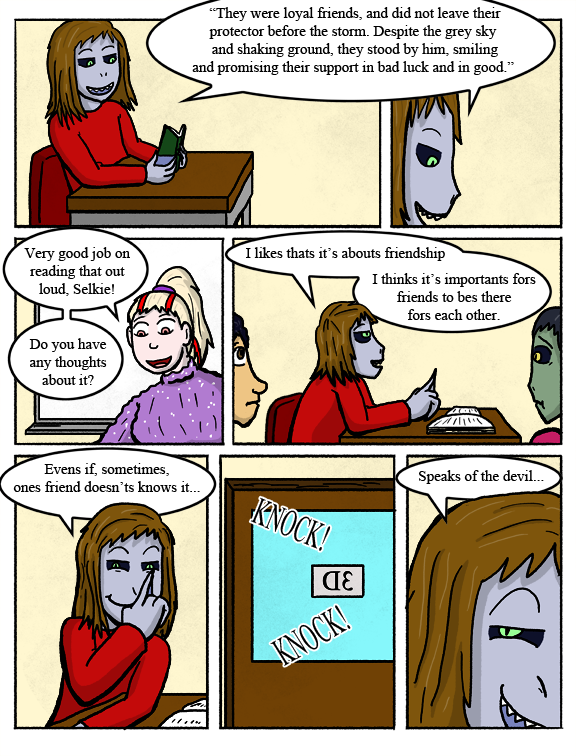According to Good Reads, the actual quote is:
“Joyful friends, mostly loyal, they hadn’t abandoned their protector before the gathering storm; and despite the threatening sky, despite the shuddering earth, they remained, smiling, considerate, and as devoted to misfortune as they had been to prosperity.”
But since the cast are reading an abridged third-grade-appropriate version, I tweaked the phrasing.
Also, it doesn’t come up much, but Selkie has an easier time speaking in not-plurals when she’s quoting or reading something. Different parts of the brain.
Today's edition of the Secret Commentary is empty, because Dave failed to come up with something for it.






I understand this, I used to be fluent in Spanish as both a speaker and a reader. After the wreck I no longer understood someone speaking Spanish but I could still read and understand it.
I’m reminded of a classmate who had cerebral palsy. Stuttered quite severely in normal conversation, but if he was acting in a play or reading out loud, no stutter.
Another that speech therapists know, which I’ve seen firsthand from stroke victims—you can have someone with so much damage to the language part of the brain that they can’t answer the question “what is your name” or get past “c” trying to write the alphabet, but ask them to *sing* the alphabet or some other song they know, and they can get all the way through without issue.
It’s weird how sectionalized stuff like that is in the brain.
It’s even weirder when you study how the brain stores memories. That is some creepy sh**. Really creepy.
interesting! can you elaborate?
When the brain stores memories, it doesn’t work like a video recorder. The brain isn’t capable of this kind of detailed recall at all times. We can, in short bursts, memorize details, but it’s usually taking lazy shortcuts. Just think of your drive to work. You van recall getting into your car then next thing you know, you’re in the office. You didn’t zone out, your brain just determined that trip was so mundane it wasn’t worth storing since its identical to many other trips.
What it’s doing is taking bits and pieces of the event and then filling in the details from a sort of “library” of generic stuff. When you recall the memory, you’re not really recalling the event but parts of it plus replaced generic stuff that didn’t really happen. Further, memory degrades over time, so your brain will replace more and more of the actual events with generic information to the point that the memory is useless. If we could live long enough, we could reach a point where all of our childhood memories are nothing more than generalized nonsense.
Rapid moving or traumatic events are particularly bad as your brain will use more generic junk to fill in details you’d rather not remember or add information that never happened. You can stage a fake robbery in the mide of a park and then ask witnesses to describe what happened. Most people wont have paid much attention or were too scared of the event to pick up any details and what happens is you’ll get highly stereotyped recollections that build on each other as false memories when a different witness hears the first testimony. This is why testimony is considered weak in a criminal case – your memory is unreliable.
A good show to watch is called Brain Games that National Geographic puts out. It discusses all these weird things the brain does to us.
It’s basically the same idea as computing compression, but somewhat lossy.
If you have a piece of information that is repetitive, you look for another piece of information that’s identical and just say “use that instead” so you only have to store it once. In the case of the brain, that particular piece of information might not be identical (or very precise), but it’s close enough to be functional.
What’s more interesting to me is the way that there’s stuff stored in there that seems to be hard to get at. For example if I worked out a solution, then completely forgot that I worked it out. The same thing comes up again a few months later, I have no memory of it, and start working toward the same solution. Then halfway through, something looks familiar, and suddenly I remember that I did all of this before and the whole process and solution I arrived at comes back to me.
It must have been stored somewhere or I wouldn’t remember it at all even when prompted, but it wasn’t accessible enough to come up with even when asked the idnetical question.
I think it was Mel Tillis, a country singer, who had a terrible stutter, but only when talking. Singing, it never showed up!
Uh ou, what did she do.
Reminds me of how Bill in the novel ‘It’ had a problem with stuttering but could quote others and not stutter one bit.
Scatman John did the same thing. He even lampshaded it in one of his earliest songs:
“Everybody’s sayin’ that the Scatman stutters
But doesn’t ever stutter when he sings
But what you don’t know, I’m gonna tell you right now
That the stutter and the scat is the same thing
Yo, I’m the Scatman”
… that was meant as a reply to Ed Rhodes, above.
Speculation time (since I don’t think there’s an obvious answer): Who’s at the door?
Flower delivery, or a singagram?